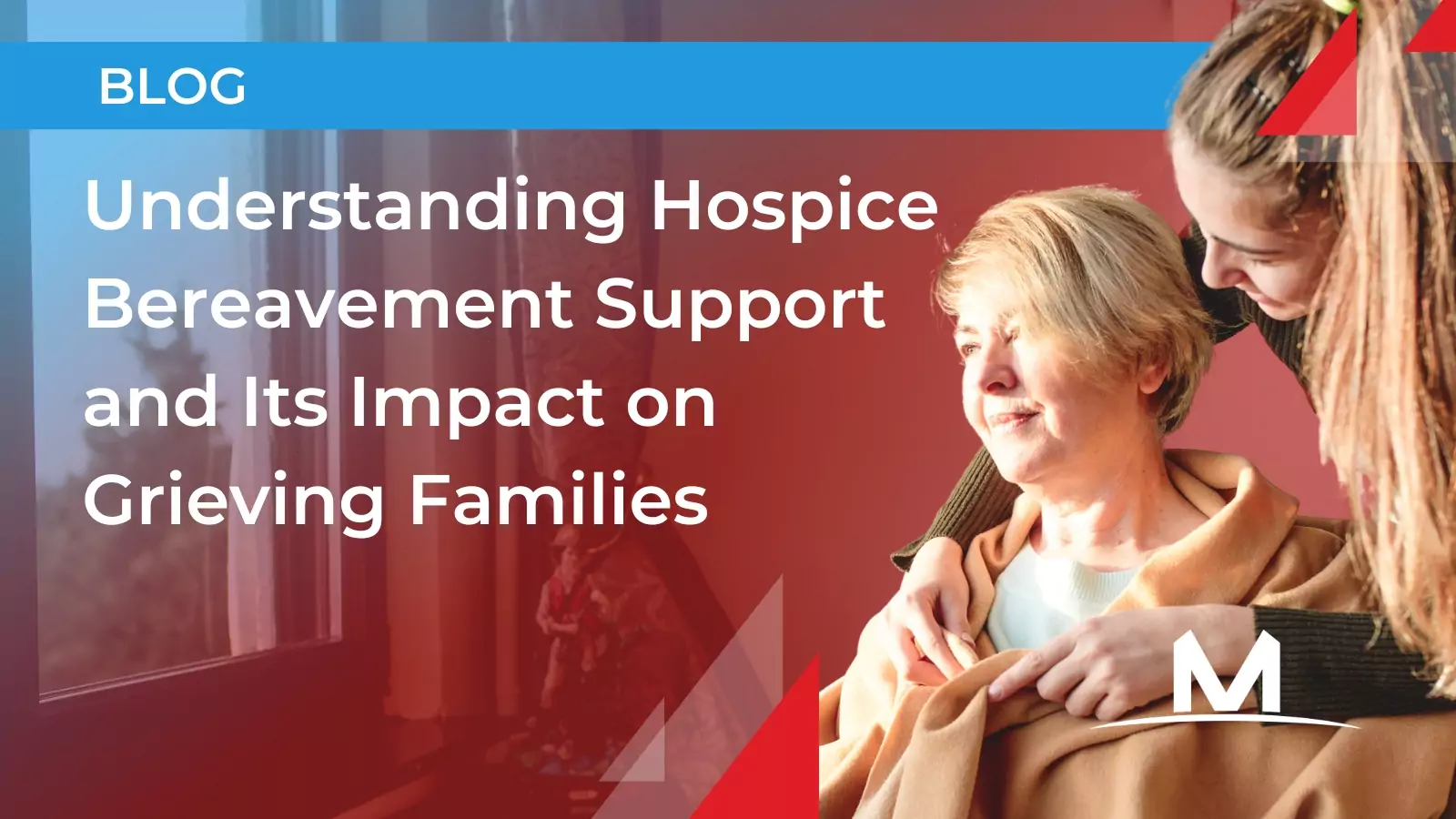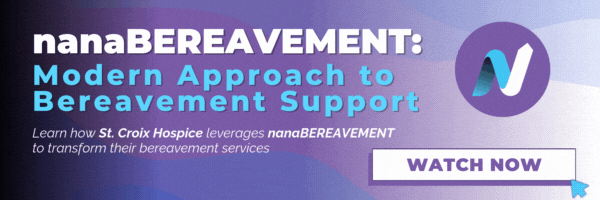Understanding Hospice Bereavement Support and Its Impact on Grieving Families

Author: Harper Dion
Edited: October 16, 2024
Posted: May 14, 2024
How nanaBEREAVEMENT Is Transforming Hospice Bereavement Support [Free Webinar]
Dealing with loss is one of the single most difficult challenges we face in our lifetimes. This holds true even in hospice settings where loss is inevitable. The shocking event and emotional outcomes prove intensely challenging for all parties involved. Loss is a universal experience that everyone will experience in a different way.
Although there is no singular correct way to process these emotions, the importance of understanding hospice bereavement support and grief acknowledgement is an essential step in moving forward following the passing of a loved one. The purpose of hospice care is to provide comfort and essential services as patients approach the end of life, ultimately to make this transition as peaceful as possible while providing counseling to the patient and family.
Following passing, the essential process of hospice bereavement support begins to assist family and close acquaintances in processing grief and identifying coping methods. As families begin to acknowledge loss and navigate grief, hospice organizations play a pivotal role in providing bereavement resources and care for all parties navigating this process.
Understanding Hospice Bereavement Support
Hospice bereavement support is defined as formalized support, counseling, and resources for grieving parties both before and after the passing of a loved one to assist with issues related to grief, loss, and adjustment.2 Through the Medicare hospice benefit, family and close friends of the deceased have access to bereavement care for 13 months following the death of the patient.1 Every hospice agency handles bereavement care as a part of Medicare Hospice Conditions of Participation. In a quality hospice operation these resources are quickly available to assist families and friends in coping with their grief in a healthy way. Comprehensive bereavement plans are tailored case by case and provide a similar comfort to the family as the hospice provided to the patient, ultimately bringing families to terms with their loss and helping them cherish the happy memories they hold with their loved one. Hospice bereavement support initiatives provide families with tailored access to counseling, support, resources, and sometimes contact with other grieving parties to feel less alone while navigating the incredible challenge of loss.
The Impact of Hospice Bereavement Support on Grieving Families
The main purpose of hospice is to provide comfort and care during the difficult end-of-life period. As hospices provide end-of-life care, the same themes of comfort throughout difficulty are apparent in the bereavement care process for families. Hospice bereavement support goes far beyond simply checking off a CoP requirement, but further assists families by:
1. Providing Emotional Support
Hospice bereavement support serves as a comforting embrace during the difficult period of grief. Trained counselors and support networks play a pivotal role in providing a safe space for individuals to express their emotions openly. This emotional support extends beyond mere sympathy; it includes active listening, empathy, and understanding. Through one-on-one counseling sessions or group therapy, families find solace in sharing their experiences, entering an environment where the weight of grief can be shared and, to some extent, alleviated.
2. Facilitating Coping Mechanisms
Grief is a deeply personal experience, and hospice bereavement support recognizes the diverse ways individuals cope with loss. Tailored bereavement plans help grieving families identify and implement coping mechanisms that resonate with their unique needs. Whether through creative outlets, memorial activities, or simply providing resources to navigate the practical aspects of loss, bereavement care guides families toward constructive ways of managing the pain. These coping mechanisms not only aid in the immediate aftermath but also lay the foundation for long-term resilience.
3. Building a Sense of Community and Understanding
The journey through grief can be isolating, but hospice bereavement support creates a sense of community among those who share the common experience of loss. Group support sessions and community events allow grieving families to connect with others who understand the depth of their sorrow. This shared hospice bereavement support forms a powerful connection, breaking the feelings of isolation and creating a network where individuals can find strength together. Through these connections, families discover that they are not alone in their grief, fostering a sense of communal understanding that lightens the burden of loss.
The impact of hospice bereavement support goes beyond traditional notions of support; it becomes a lifeline for grieving families, guiding them through the intricate process of healing and helping them move past the incredibly difficult challenge of losing a loved one.
The MHA Difference – Bereavement Care
Understanding hospice bereavement support is crucial in navigating the challenging terrain of grief and loss. Hospice organizations play a pivotal role not only in providing comfort and care during the end-of-life journey but also in extending vital support to grieving families through comprehensive bereavement initiatives.
These initiatives go beyond meeting regulatory requirements; they offer emotional support, facilitate personalized coping mechanisms, and foster a sense of community and understanding. The impact of hospice bereavement support is transformative, serving as a lifeline for families grappling with the profound challenge of losing a loved one.
As an agency, the focus on top of license patient care and comfort must extend to the families of those patients. Working to optimize your bereavement initiatives, ensuring compliance, efficiency, and overall quality for patients and their families is essential in the hospice industry. At MHA, our team of industry leading strategic experts hold the tools and experience to optimize your agency to supply this top-of-line care. Reach out to our team at [email protected] or visit www.maxwellhca.com to learn more about MHA's tech-enabled solutions for productivity, communication, and bereavement.
This blog was originally published as "The Importance of Bereavement Care in Hospice" by Harper Dion on May 14, 2024. The MHA team has since updated this article to ensure accuracy and relevance.
Resources
1. https://www.caringinfo.org/types-of-care/bereavement-care/
2. https://www.nhpco.org/wp-content/uploads/Bereavement_CoP_Tip_Sheet.pdf

